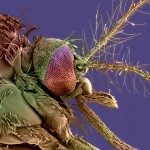Lien vers Pubmed [PMID] – 31345269
Parasit Vectors 2019 Jul;12(1):363
Aedes caspius (Pallas, 1771) is a floodwater mosquito species widely distributed in the Western Palaearctic. As an anthropophilic species, its role as an arbovirus vector may be the key for understanding the transmission cycle of certain diseases in Europe such as Zika virus (ZIKV). Concerning vector competence for ZIKV, studies related to Ae. caspius are still scarce. ZIKV is an arbovirus that has provoked a widespread epidemic in the Pacific region (2007-2013) and in the Americas (2015-2016). ZIKV is associated with serious neurological injuries (e.g. microcephaly) and Guillain-Barré syndrome. Due to the ZIKV epidemics in the American continent, some viraemic travellers coming from endemic countries have been reported in Europe. More knowledge is therefore required to define the susceptibility of autochthonous mosquito species such as Ae. caspius for ZIKV in order to improve arbovirus surveillance and control programmes. In the present study, the vector competence of a European population of Ae. caspius was evaluated for two ZIKV lineages, the Suriname ZIKV strain (Asian lineage) and the MR766 ZIKV strain (African I lineage). Females were tested at 7, 14 and 21 days post-exposure (dpe) to infectious blood meals. An Ae. aegypti PAEA strain was used as a positive control.

